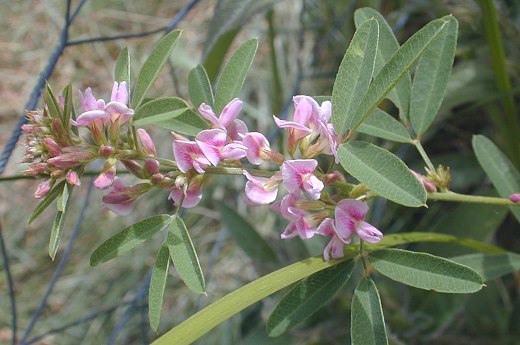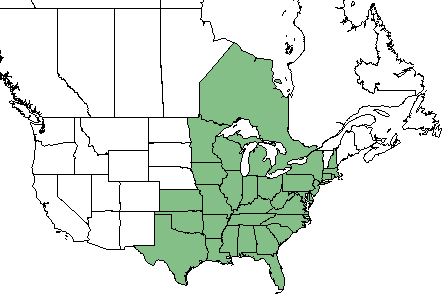Difference between revisions of "Lespedeza virginica"
(→Ecology) |
|||
| Line 37: | Line 37: | ||
<!--===Seed dispersal===--> | <!--===Seed dispersal===--> | ||
<!--===Seed bank and germination===--> | <!--===Seed bank and germination===--> | ||
| − | + | ===Fire ecology=== <!--Fire tolerance, fire dependence, adaptive fire responses--> | |
| + | ''L. virginica'' increases in abundance with increasing fire frequency. <ref name= "Burton 2009"> Burton, J. A. (2009). Fire frequency effects on vegetation of an upland old growth forest in eastern Oklahoma. Environmental Science. Stillwater, Oklahoma, Oklahoma State University. Bachelor: 78. </ref> | ||
<!--===Pollination===--> | <!--===Pollination===--> | ||
<!--===Use by animals===--> <!--Herbivory, granivory, insect hosting, etc.--> | <!--===Use by animals===--> <!--Herbivory, granivory, insect hosting, etc.--> | ||
Revision as of 20:17, 13 June 2018
Common name: slender lespedeza [1], Virginia lespedeza [2]
| Lespedeza virginica | |
|---|---|

| |
| Photo by the Illinois Wildflowers Database | |
| Scientific classification | |
| Kingdom: | Plantae |
| Division: | Magnoliophyta - Flowering plants |
| Class: | Magnoliopsida - Dicots |
| Order: | Fabales |
| Family: | Fabaceae |
| Genus: | Lespedeza |
| Species: | L. virginica |
| Binomial name | |
| Lespedeza virginica L. | |

| |
| Natural range of Lespedeza virginica from USDA NRCS Plants Database. | |
Contents
Taxonomic Notes
Synonyms: none
Varieties: none
Description
L. virginica is a perennial forb/herb of the Fabaceae family native to North America and Canada. [1]
Distribution
L. virginica is found in the eastern half of the United States, as well as the Ontario region of Canada. [1]
Ecology
Habitat
L. virginica proliferates in sandhills, woodlands, and woodland borders. [2]
Phenology
L. virginica flowers August-October. [3]
Fire ecology
L. virginica increases in abundance with increasing fire frequency. [4]
Conservation and Management
L. virginica is listed as threatened by the New Hampshire Natural Heritage Inventory Division of Land and Forests and by the Wisconsin Department of Natural Resources Bureau of Endangered Resources. [1]
Cultivation and restoration
Photo Gallery
References and notes
- ↑ 1.0 1.1 1.2 1.3 USDA Plant Database https://plants.usda.gov/core/profile?symbol=LEVI7
- ↑ 2.0 2.1 Weakley, A. S. (2015). Flora of the Southern and Mid-Atlantic States. Chapel Hill, NC, University of North Carolina Herbarium.
- ↑ PanFlora Author: Gil Nelson URL: http://www.gilnelson.com/PanFlora/ Date Accessed: 5/24/18
- ↑ Burton, J. A. (2009). Fire frequency effects on vegetation of an upland old growth forest in eastern Oklahoma. Environmental Science. Stillwater, Oklahoma, Oklahoma State University. Bachelor: 78.